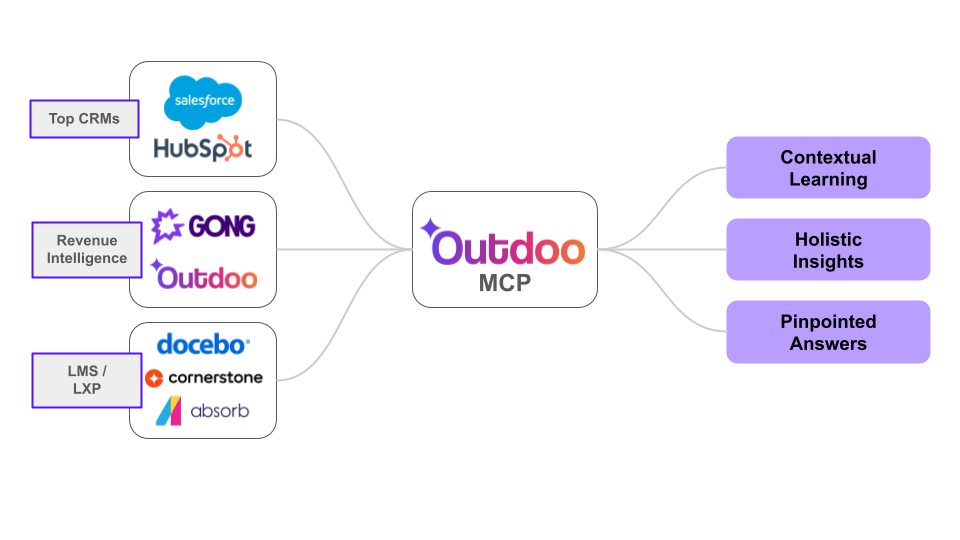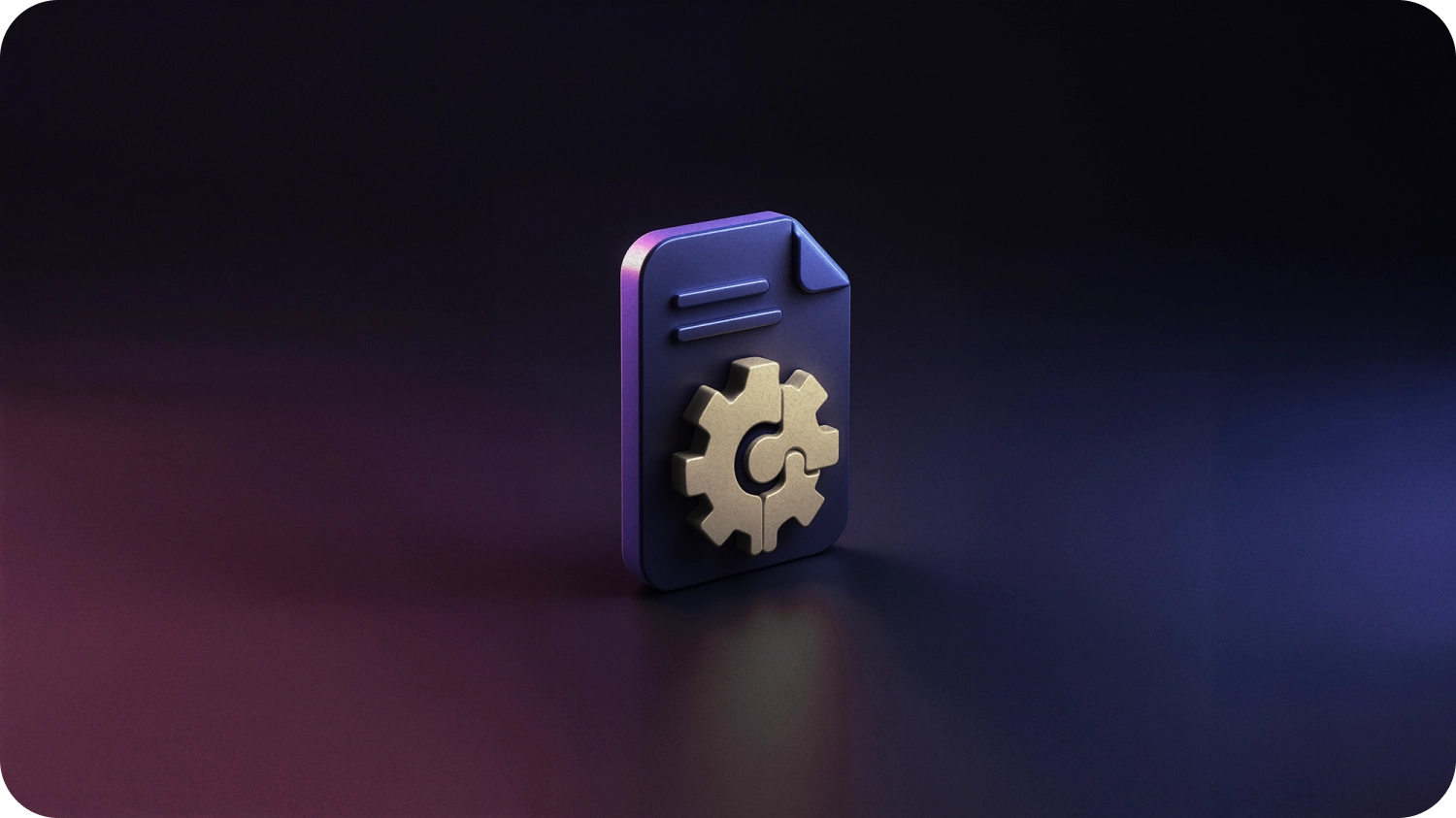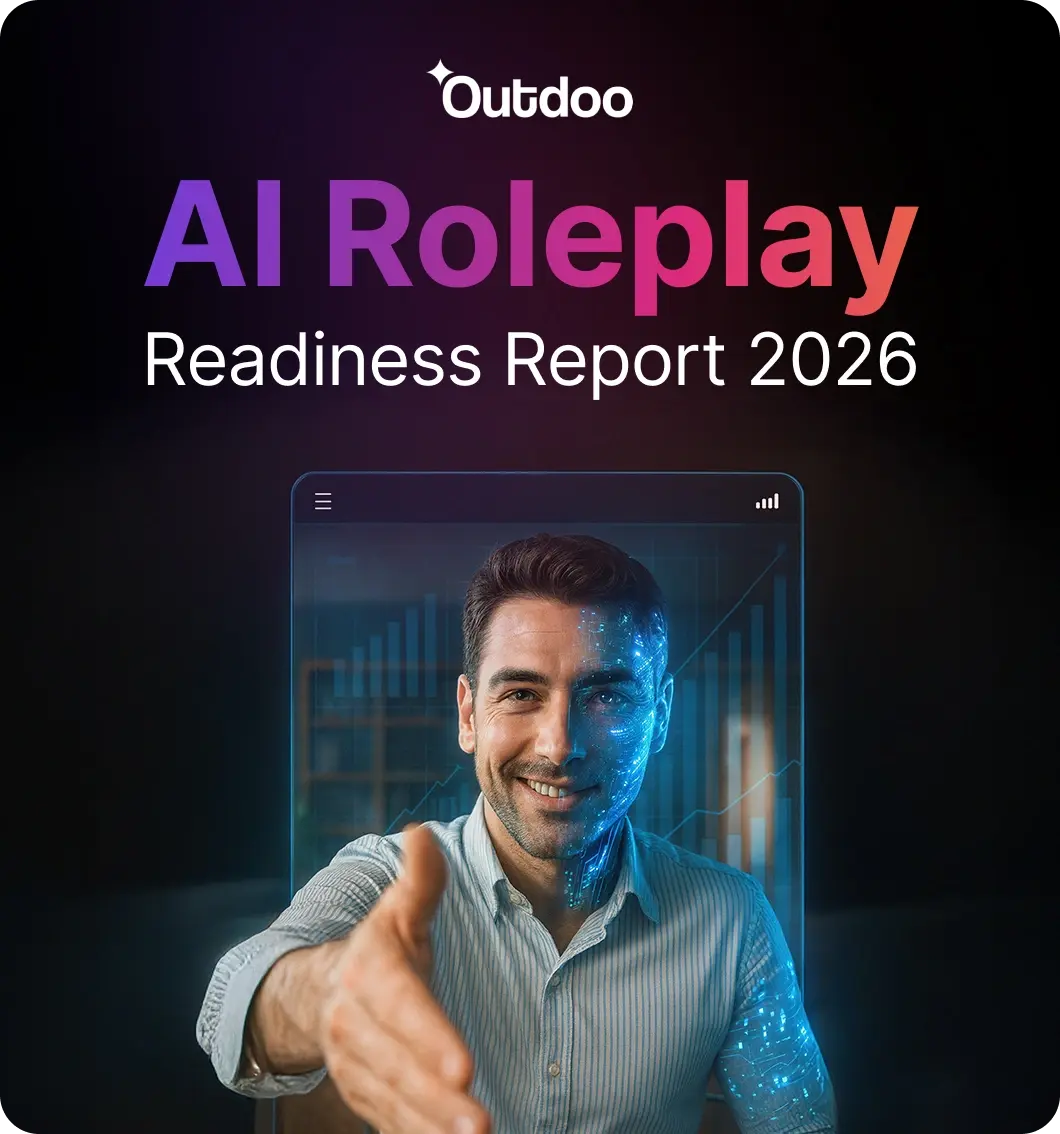Sales teams today face an uphill battle against fragmented tools, manual processes, siloed customer context, and sluggish coaching cycles. CRM systems, call recordings, learning platforms, and analytics all hold valuable insights - yet they often operate in isolation. The result is disconnected tools, manual enablement, siloed context, and slow coaching feedback loops that sap productivity.
This is where the Model Context Protocol (MCP) comes in. Originated by Anthropic, MCP is an emerging open standard that acts as a universal adapter for AI, securely connecting models to the apps and data businesses already depend on. By plugging AI assistants directly into CRM data, content libraries, learning systems, and more, MCP unlocks contextual, AI-powered workflows that can transform every role on the revenue team.
This blog will explore how MCP addresses key sales pain points, highlight real-world use cases by persona and workflow, and introduce how Outdoo’s MCP implementation (with features like Ask Revie, AI Roleplays, unified coaching insights, and CRM/LMS integrations) is enabling a new era of intelligent, connected sales enablement.
Sales Pain Points and How MCP Addresses Them
Even with modern tech stacks, sales teams often run into the same frustrating problems. Data is scattered across tools, processes remain manual, and fragmented systems limit performance. Here’s how MCP addresses these core challenges to make sales workflows truly intelligent:
1. Disconnected Tools and Siloed Data
Modern sales organizations rely on a myriad of tools -CRM platforms for customer info, call recording software for conversations, learning management systems for training content, and more. These tools rarely talk to each other, leaving data siloed and reps constantly switching contexts.
This disjointed toolkit makes it difficult to get a 360° view of deals or customers, leading to missed opportunities and inconsistent messaging. MCP directly tackles this fragmentation by providing a standardized, secure way for AI to interface with any business software in real time.
Think of MCP as an electrical adapter that lets one AI assistant plug into all your systems, so salespeople can simply ask the AI and instantly pull information or trigger actions across previously disconnected applications. No more building expensive one-off integrations for each tool or manually cobbling data together.
The AI, acting as an MCP client, can retrieve a deal status from Salesforce, fetch the latest support ticket from Zendesk, or pull a pricing sheet from SharePoint all within the same conversation, delivering a unified context when and where it’s needed. In short, MCP dissolves data silos by making your entire sales stack accessible through one intelligent interface.
2. Manual Enablement and Context Gaps
Sales enablement has traditionally been a manual affair, where content gets created and pushed to reps via emails or portals, and reps often waste time searching for answers in knowledge bases or playbooks. Important context (like a prospect’s industry or past interactions) may not accompany the generic guidance, forcing reps to mentally stitch together info from multiple sources. With MCP, enablement becomes embedded and proactive.
An MCP-driven assistant like Outdoo’s Ask Revie serves as an always-on, interactive coach that reps can query in natural language for instant, contextual answers. Instead of thumbing through PDFs or waiting on a manager, a rep can ask, “What are the key product features to highlight for Client X’s use case?” and the AI will securely pull the latest product info in context with that client’s industry and history, if available.
This kind of self-service enablement dramatically reduces time spent searching through docs and systems. It also ensures consistencye, as every rep gets guidance from the same up-to-date source.
By bridging to content management systems, LMS courses, and CRM data, MCP closes context gaps: the guidance a rep receives is not one-size-fits-all, but tailored to the situation at hand (e.g. relevant case studies for the prospect’s vertical, or reminders of past pain points mentioned on previous calls). The result is a more prepared, confident salesforce that can leverage knowledge on the fly, rather than relying on memory or cumbersome manual lookups.
3. Slow Coaching Feedback Loops
Coaching sales reps has enormous impact on performance. Even companies with formal coaching programs see significantly higher win rates and productivity ,yet too often coaching is reactive and sporadic. Sales managers might review calls days or weeks after the fact, give feedback long after the moment has passed, and struggle to identify patterns without hours of analysis.
These slow feedback loops mean reps can develop bad habits or miss targets before issues are addressed. MCP accelerates and scales coaching feedback by integrating AI deeper into the coaching process. For example, an MCP-powered system can automatically analyze every sales call and score it against key behaviors (talk tracks, product knowledge, soft skills), then immediately surface coaching insights.
Outdoo’s platform, for instance, can review calls and even auto-generate microlearning lessons in real time based on a rep’s performance by turning each call into a timely learning opportunity. Rather than waiting for a manager’s quarterly call review, reps could get an instant rundown of their strengths, areas to improve, and even targeted content recommendations right after each call.
Managers likewise benefit: they receive curated highlights of coachable moments and trend reports without listening to dozens of recordings manually. The feedback loop shrinks from weeks to minutes. This proactive approach to coaching, baking continuous feedback into daily workflows, is exactly what Outdoo emphasizes in its MCP-driven design.
MCP Use Cases for Every Sales Persona
One of the strengths of MCP in sales is that it delivers value across the entire revenue team. Let’s look at how different personas on a sales team can leverage contextual, AI-powered workflows:
a. Sales Development Representatives (SDRs)
For SDRs focused on top-of-funnel outreach, MCP can be a game-changer in terms of efficiency and effectiveness. An SDR can use an AI assistant to research prospects and prep outreach in seconds. For example, instead of juggling a CRM, LinkedIn, and a sales enablement tool, an SDR could simply ask the assistant: “Show me what we know about Company ABC and any recent touchpoints.”
Through MCP, the AI might pull the lead’s CRM record, surface recent emails or calls, and even summarize relevant news about that prospect – all in one concise answer. This ensures the SDR’s cold call or email is informed by the latest context without manual digging. Additionally, SDRs can practice their pitch using AI Roleplay simulations. Outdoo’s roleplay bots (available in voice, chat, or video formats) let SDRs rehearse common scenarios like handling a cold call with an AI that responds like a real prospect.
b. Account Executives (AEs)
For account executives working complex deals, context is king. MCP empowers AEs with a kind of AI co-pilot that keeps track of deal progress, surfaces key insights, and even preempts challenges. Before a big discovery meeting, an AE can ask the assistant to “summarize all interactions with Client XYZ and what pain points have come up so far.”
The AI will traverse call transcripts, CRM notes, and emails to produce a briefing that ensures the AE is fully prepared (no more digging through dozens of records). During live calls, the benefits continue: if a prospect mentions a competitor, the AI can instantly fetch relevant competitive insights or battle cards so the AE can respond knowledgeably on the spo. This kind of real-time contextual support can be the difference between confidently addressing an objection versus fumbling through a response.
After the call, the MCP-connected system can auto-generate notes and next steps. For instance, Outdoo’s Ask Revie can provide a full rundown of the customer’s stated pain points and recommended follow-ups without the AE having to take manual note.
Not only does this save time, it also ensures that critical deal info is captured accurately and consistently. In short, AEs get to spend more time strategizing and building relationships, and less time on administrative scramble .The AI handles the context aggregation and even some of the heavy lifting in follow-up actions.
c. Sales Managers and Leaders
Sales managers benefit enormously from the unified visibility and coaching leverage that MCP unlocks. Rather than bouncing between CRM reports, call recordings, and rep 1:1s, a manager can rely on the AI (fed by MCP) to keep a pulse on the team’s performance.
Common use cases include pipeline inspection where a manager might ask, “Which deals are at risk this quarter?” and get an AI-curated summary pointing to stalled deals, lack of recent activity, or low scores on recent discovery calls, all linked back to the source data. Instead of manually combing through dashboards, the manager gets immediate, actionable insights.
Managers can also set up automated alerts and reports via MCP integrations: for example, Outdoo allows defining triggers like “if a deal marked Closed Lost had no manager coaching note, send an alert” or “generate a weekly leaderboard of reps by average call score. This turns static reporting into proactive workflows, so managers are notified about what matters most.
Crucially, MCP extends into coaching enablement for managers too. The AI can highlight key coachable moments across calls (e.g. flagging when a rep didn’t ask any open-ended questions on a discovery call), making it easy for the manager to pinpoint where a rep needs support. Outdoo even leverages AI to recommend improvements to coaching scorecards and rubrics .
d. Revenue Operations (RevOps)
For RevOps and operations professionals, MCP provides a breath of fresh air in managing the sales tech stack and processes. RevOps often struggle with integrating disparate systems and maintaining a single source of truth. MCP’s standardized client–server approach drastically reduces integration complexity.
Instead of building and maintaining custom API connections between every tool, RevOps can deploy MCP servers (many vendors provide them out-of-the-box) so that the AI can interface with each system through a common protocol. This means connecting a new tool (a dialer, a learning platform, a data warehouse) is more like plugging in a compatible module rather than a months-long IT project.
For example, connecting Salesforce or HubSpot via Outdoo’s MCP integration might be as straightforward as entering an API key and toggling which data objects to expose. RevOps can thus ensure the sales team has all relevant data at their fingertips (through the AI assistant) without worrying about data silos or sync issues.
e. Sales Enablement & Trainers
Sales enablement leaders are charged with ramping up reps quickly and improving their skills continuously. MCP supercharges their efforts by making training more contextual, dynamic, and measurable. With Outdoo’s MCP-based platform, enablement managers can deliver interactive training and practice at scale.
A prime example is the AI Roleplay capability: trainers can create realistic buyer personas and scenarios that reps can practice with, as if they’re chatting or speaking with a live customer. These roleplays can be offered in multiple modes (text chat, voice calls, even video-based scenarios) to mimic real sales conversations. Crucially, they are tied into formal learning paths: Outdoo’s Roleplay Courses are SCORM-compliant and integrate with enterprise LMS platforms like Absorb and Docebo.
That means enablement can embed these AI-driven simulations into onboarding curricula for continuous training. The MCP integration ensures that the training experience adapts to each rep and if AI notices a rep consistently struggles with handling pricing objections, it might suggest a short e-learning video or even generate a new micro-lesson on that topic, right when it’s needed.
This dynamic, data-driven approach keeps training agile and relevant. Enablement leaders also benefit from the analytics side: every roleplay attempt, practice session, and knowledge query can be tracked, providing insight into skill gaps across the team. They can see, for example, that the Bangalore sales team has lower scores on product knowledge roleplays than the London team, and adjust their focus accordingly.
Overall, MCP turns sales enablement into a continuous, contextual loop, where reps learn, practice, get feedback, and reinforce skills in their day-to-day workflow rather than only in periodic training sessions.
Key Sales Workflows Enhanced by MCP
Beyond individual personas, MCP-powered solutions improve entire sales workflows that span the revenue cycle. Here are some high-impact workflows that Outdoo MCP elevates:
1. Onboarding New Reps:
Instead of throwing new hires into a firehose of information, managers can use Outdoo’s MCP integration to create a structured yet hands-on onboarding experience. New reps progress through Roleplay Courses that integrate with the company’s LMS for tracking, while practicing real-life scenarios in a safe sandbox.
They can ask the AI questions at any time (“How do I log a call in the CRM?”, “What’s our pitch for industry X?”) and get immediate answers drawn from internal documentation and playbooks. This on-demand assistance accelerates learning. The result is faster ramp-up times and better knowledge retention, as reps are actively using the knowledge with AI guidance from day one.
2. Pipeline Inspection & Forecasting:
Regular pipeline reviews become far more efficient when an AI co-pilot does the heavy lifting. With MCP, sales leaders can essentially converse with their pipeline. For example, Ask Revie can be prompted with, “List all Q4 deals over $50k that haven’t had any activity in 30+ days,” and it will query the CRM and return the list with context, or even alert the respective owners.
Managers can drill down further: “What’s the latest status and next step for Deal X?” , then the the AI will summarize the opportunity, last meeting outcome, and next actions from CRM and call notes.
This saves countless hours that would otherwise be spent wrangling spreadsheets and reports. Forecast calls likewise become more data-driven; the AI can highlight which deals changed stage this week, which slipped, and aggregate win probabilities, giving RevOps and leadership a continuously updated forecast view. By having a unified, AI-accessible pipeline, forecasting becomes more precise and responsive, with insights available on-demand rather than in end-of-month scrambles.
3. Coaching & Skill Development:
Coaching is not a one-time event but an ongoing workflow, and MCP enables it to happen continuously and at scale. Key coaching moments , like post-call feedback, weekly 1:1s, or team call reviews are supercharged by AI.
After every call, Outdoo can automatically score the conversation against the team’s success criteria (e.g., did the rep set next steps, did they handle objections well?) and provide instant feedback to the rep along with recommendations (perhaps a suggestion to review a particular talk track or competitor fact sheet if those were weak). Managers then use these AI-generated insights during their coaching sessions, making 1:1s far more targeted and productive.
They might say, “I noticed from Revie’s summary that you struggled when the prospect mentioned Competitor Z. Let’s roleplay that scenario now.” The AI can even join the session by simulating the prospect, giving the rep a chance to practice live. Additionally, the AI can help managers evolve their coaching programs by analyzing patterns across the team and recommending adjustments to training focus or scorecard metrics. The entire coaching workflow, from call analysis to skill development to follow-up practice, becomes a seamless loop facilitated by MCP, ensuring every rep steadily improves in the areas that matter most.
4 Performance Analysis & Continuous Improvement:
Sales leaders and executives need to see the big picture of what’s working and what’s not. Traditionally, they’ve relied on static dashboards or periodic BI reports, often lacking detail or real-time data. With MCP connecting all sales activities, every interaction and outcome flows into a unified performance view.
Outdoo’s platform, for example, funnels data from roleplays, live calls, CRM updates, and training activities into performance dashboards that track individual and team progres. Leaders can slice the data however they need, by team, by region, by product to spot trends. Maybe they find that win rates are highest for reps who completed certain roleplay courses, or that a drop in call activity precedes pipeline slippage in a certain segment.
These insights allow for data-driven decisions, like adjusting the onboarding program or reallocating enablement resources. And because the AI is part of the workflow, an executive could even ask it questions directly: “How did our Q3 performance compare to Q2 in terms of average deal size and sales cycle?”, and get an answer with charts pulled from the connected systems.
By having AI deeply integrated through MCP, continuous improvement becomes part of the culture: the system not only reports on performance but can proactively suggest areas for improvement, closing the loop from insight to action. In sum, MCP ensures that revenue teams are always learning from their data and iterating on their processes, rather than flying blind or waiting for quarterly reviews.
Outdoo MCP: Bringing It All Together
Outdoo MCP integrates data from key sales systems, including CRM platforms (e.g. Salesforce, HubSpot), conversation intelligence and call data (e.g. Outdoo’s own recordings or third-party platforms), and learning management systems (LMS/LXP like Absorb or Docebo), into a unified context hub.
By bridging these sources, Outdoo’s Ask Revie assistant can instantly surface holistic pipeline insights, contextual learning content, and pinpoint answers for reps in real time, as illustrated in this conceptual diagram.

To truly appreciate the impact of MCP, it helps to see how these pieces come together in a real solution. Outdoo AI (formerly MeetRecord) has built its AI Roleplay and Coaching platform around MCP to unify preparation, performance, and coaching in one system. Here are some of the standout capabilities of Outdoo’s MCP-powered platform that turn the concepts into concrete tools:
1. Ask Revie – Your AI Sales Assistant:
Ask Revie is Outdoo’s chat-based AI assistant that leverages MCP to act as a centralized, intelligent helpdesk for the sales team. Reps and managers can ask Revie questions about deals, pipeline, contacts, product details, or even how to use Outdoo’s features. Revie instantly parses the request, fetches the relevant data or document from connected systems, and responds with a concise, contextual answer (often including a link back to the source for transparency).
.gif)
For example, a rep can ask, “What’s the latest update on the ACME Corp deal?” and Revie will pull the CRM opportunity notes and recent call summary, providing a quick brief. Or a manager could ask, “Suggest improvements to our discovery call script,” and Revie (drawing on conversation insights and best practices) might recommend adding a new question about budget or tweaking the opener.
By centralizing Q&A and analysis through one AI interface, Ask Revie saves time and promotes data-driven decision making at every turn. It also serves as the bridge to other MCP integrations. For instance, Revie can connect to a Sales Content Management MCP server to surface the right case study when asked, or interface with a CRM MCP server to update a field as instructed. In short, Ask Revie is the command center for Outdoo’s contextual workflows, empowering users to get information or execute tasks with simple prompts.
2. AI Roleplays & Micro-Coaching:
Outdoo offers an AI Sales Roleplay suite that uses MCP to deliver realistic training simulations and on-the-spot coaching. Roleplays allow reps to practice sales conversations with an AI-powered “buyer” that behaves and responds like a human prospect. These aren’t generic chatbots, they can be tailored to specific personas, industries, and even languages (24+ languages supported) to mirror the scenarios your team actually encounters. Reps can jump into a voice or chat roleplay to practice a demo, a cold call, or an objection handling scenario, and the AI will dynamically carry the conversation.
Because the roleplay bots are integrated via MCP, they can pull context as needed . For example, referencing a product name or pricing from your actual catalog if the rep brings it up. After the session, the system provides a scorecard and feedback, highlighting what the rep did well and where to improve. These scorecards are customizable (and as noted earlier, even AI-tunable via Revie’s suggestions) so that the criteria align with your organization’s definition of a great call. Outdoo also offers Roleplay Courses which string together multiple scenarios in a curriculum, with full LMS integration for tracking and reporting.
What sets Outdoo’s approach apart is the closed-loop nature of practice and feedback: every practice run flows into the rep’s performance dashboard, contributes to their coaching plan, and even triggers adaptive learning content. If a rep struggles in a roleplay, the system might recommend a specific training video or another round of practice on that skill. This creates a virtuous cycle of learn–practice–improve that continuously sharpens skills. By the time reps face real customers, they’ve essentially seen it (or something like it) before.
3. Unified Coaching & Insights:
Coaching is where all the data and context truly pay off, and Outdoo’s MCP-driven insights give sales leaders a holistic view to coach intelligently. The platform provides Coaching Insights dashboards that combine data from live sales calls (recordings, transcripts, sentiment analysis), roleplay exercises, and even CRM outcomes. This unified view lets managers correlate activities with results. For example, seeing that a rep who scores high on discovery call thoroughness (from call analysis) also has higher win rates, thereby validating the behavior to reinforce.
Conversely, if a rep’s performance dips, the manager can quickly pinpoint why: perhaps the AI notes their talk time spiked on recent calls and their questions asked went down, indicating a need to coach on listening. Outdoo uses MCP to also aggregate deal intelligence (e.g. which deals have slipped, which competitors are cropping up) so that 1:1s and team meetings can focus on what matters most.
The system delivers insights like, “Top 3 reasons deals lost this month” or “Calls where pricing was discussed but no next step was set,” drawing from patterns it detects. All of this helps sales leaders move from anecdotal coaching to evidence-based coaching.
And importantly, these insights are not siloed in yet another dashboard; they are available on demand via Ask Revie as well. A VP of Sales could literally ask, “How is the team performing on our key coaching metrics this quarter?” and get a snapshot answer. By unifying previously siloed metrics (training, practice, performance) into one MCP-connected system, Outdoo ensures that coaching is guided by a complete, data-driven picture of each rep and deal – leading to sharper leaders and stronger teams.
4. Seamless CRM and LMS Integrations:
As a true enterprise solution, Outdoo MCP doesn’t require ripping out your existing systems, Iinstead it embraces them. Outdoo provides native MCP connectors for popular CRMs like Salesforce and HubSpo, meaning the AI assistant can read from (and write to) those systems securely with minimal setup. Meeting notes, call summaries, and task updates can sync back to the CRM automatically, keeping data hygiene with no extra effort.
On the enablement side, Outdoo’s integration with learning platforms (e.g. Absorb, Docebo) ensures training content flows in and out. If your company has a SharePoint or Google Drive full of playbooks and battle cards, those too can be linked via MCP so that Ask Revie can surface a specific slide deck or FAQ when needed. This plug-and-play integration ethos is core to MCP. Outdoo leverages it so that your AI-powered workflows sit on top of and alongside your current tools, enhancing them rather than replacing them.
It’s worth noting that MCP is not just a niche or proprietary approach by Outdoo; it’s a burgeoning standard gaining traction across industries. CRM platforms like Salesmate have integrated MCP to let their AI copilots securely tap into customer data and external tools in real time. Even an SEO analytics company like Ahrefs has built an MCP connector so AI assistants can pull live SEO data from its platform.
This growing adoption underscores a key point: MCP is a game-changer well beyond just one use case, creating a more connected and intelligent future for any workflow that AI touches. In the sales domain, Outdoo’s implementation of MCP brings that future to life today, by weaving together enablement, execution, and analysis into one contextual fabric.
Elevate Your Sales Team with Contextual AI
By embracing MCP, revenue teams can finally have an AI that doesn’t just chat in the abstract but works alongside them in the trenches by updating records, answering questions, providing coaching nudges, and orchestrating enablement content exactly when needed. It’s a shift from reactive to proactive, from one-size-fits-all to highly personalized, from scattered to seamlessly integrated.
Outdoo’s implementation of MCP showcases how this revolution unfolds in practice: reps get an intelligent assistant that remembers every detail, managers get insights and leverage to coach at scale, and leaders get a predictably ramping, high-performing team. The Model Context Protocol is more than a tech standard; it’s the backbone of a new sales operating system.
Ready to empower your team with contextual, AI-driven workflows?
Get started with Outdoo MCP and explore what your AI sales agents could look like in action.
Frequently Asked Questions
MCP (Model Context Protocol) for Sales is an open standard that connects AI systems with your sales stack - CRM, call intelligence, and LMS, to provide real-time context, automation, and insights across workflows.
By unifying data across tools, MCP gives sales teams instant access to deal context, call insights, and learning content. This reduces manual effort, speeds up onboarding, and enables continuous, in-context coaching.
Outdoo MCP is purpose-built for revenue teams. Unlike generic copilots, it connects CRM, call, and learning systems into one AI-driven layer, empowering reps, managers, and enablement leaders with actionable insights in real time.
Yes. Outdoo MCP provides native connectors for CRMs like Salesforce and HubSpot, call intelligence tools, and LMS platforms like Docebo or Absorb, ensuring seamless, secure, and context-rich workflows without replacing your existing stack.
Teams using Outdoo MCP see faster ramp times, consistent coaching, higher win rates, and stronger data-driven decision-making. It turns fragmented enablement into one unified, AI-powered sales ecosystem.

.jpg)
.svg)

.webp)











